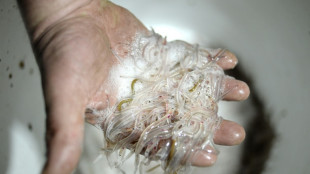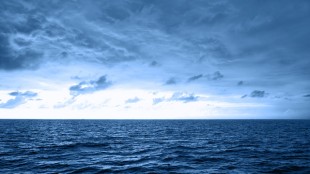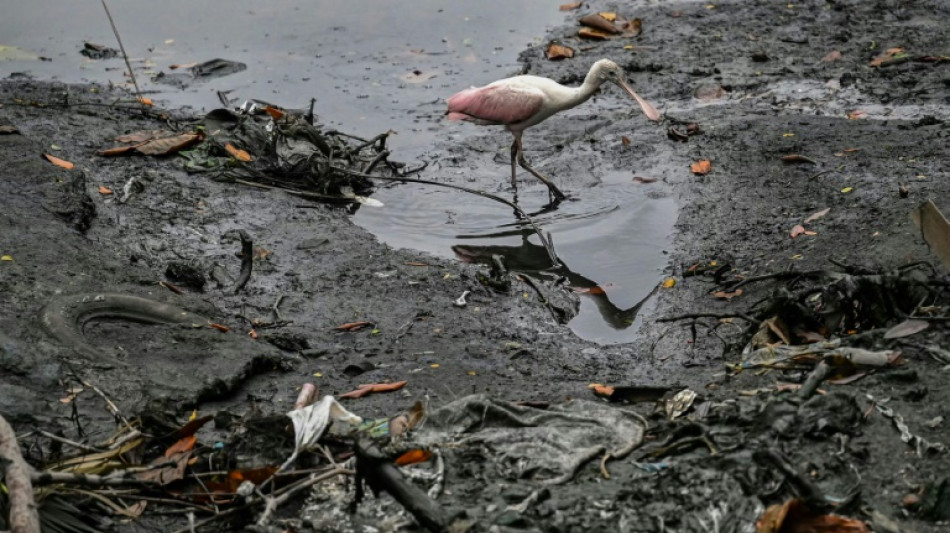
-
 Digital divas: Can Japan's virtual YouTuber craze crack America?
Digital divas: Can Japan's virtual YouTuber craze crack America?
-
WHO pandemic agreement talks face deadline crunch

-
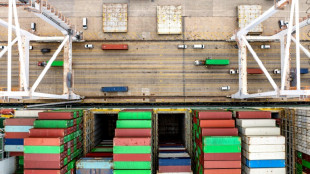 Stocks, dollar sink and gold hits record as Trump tariff panic returns
Stocks, dollar sink and gold hits record as Trump tariff panic returns
-
LeMond hails 'one in a million' Pogacar ahead of Paris-Roubaix debut

-
 Liverpool can move closer to the title as top five tension mounts
Liverpool can move closer to the title as top five tension mounts
-
Trump admits trade war 'cost' as markets hit

-
 AI only just beginning to revolutionize the NBA game
AI only just beginning to revolutionize the NBA game
-
Despite Trump pause, overall US tariff rate at highest in a century

-
 'A pain that doesn't subside' at funerals for Dominican nightclub disaster victims
'A pain that doesn't subside' at funerals for Dominican nightclub disaster victims
-
Panama deal allows US to deploy troops to canal

-
 US firm says it brought back extinct dire wolves
US firm says it brought back extinct dire wolves
-
Grieving Dominicans start burying 220 victims of nightclub disaster

-
 Aberg closes strong at 'sneaky hard' Augusta National
Aberg closes strong at 'sneaky hard' Augusta National
-
US auto union praises some Trump tariffs

-
 Australian IVF clinic admits embryo mix-up
Australian IVF clinic admits embryo mix-up
-
Rose: I've played well enough to win Masters but lack the jacket

-
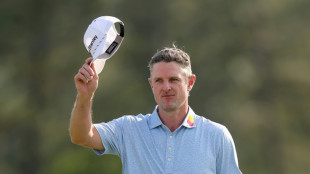 Rose again enjoys 'luxury' of first-round Masters lead
Rose again enjoys 'luxury' of first-round Masters lead
-
Rose rockets to Masters lead, defending champ Scheffler in pursuit

-
 Tesla opens first showroom in oil-rich Saudi
Tesla opens first showroom in oil-rich Saudi
-
Oscars to add new award for stunts

-
 Hatton loves being at Masters but 'It's just so hard'
Hatton loves being at Masters but 'It's just so hard'
-
'Mistakes can happen': Amorim backs Onana after Lyon nightmare

-
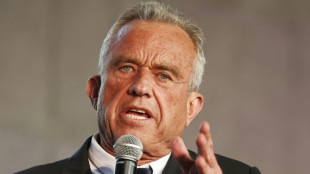 RFK Jr says study will reveal cause of autism 'epidemic'
RFK Jr says study will reveal cause of autism 'epidemic'
-
Tourist family, pilot killed in 'tragic' NY helicopter crash
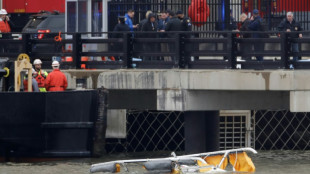
-
 No.1 Scheffler makes strong Masters start to defend title
No.1 Scheffler makes strong Masters start to defend title
-
Man Utd and Spurs draw in Europa League, Rangers hold Athletic

-
 Rose rockets to Masters lead with Scheffler and McIlroy in pursuit
Rose rockets to Masters lead with Scheffler and McIlroy in pursuit
-
Man Utd held late in Lyon after Onana errors in Europa League

-
 Man Utd held late in Lyon after Onana errors
Man Utd held late in Lyon after Onana errors
-
Wall Street rally fizzles as tariff fears resurface

-
 MLS to open 'second phase' of major season overhaul study
MLS to open 'second phase' of major season overhaul study
-
Argentina braves 24-hour strike as it awaits word on IMF loan

-
 Spain's Ballester finds relief in Masters water hazard
Spain's Ballester finds relief in Masters water hazard
-
Porro rescues Postecoglou as Spurs held by Frankfurt

-
 Grieving Dominicans start burying 200+ victims of nightclub disaster
Grieving Dominicans start burying 200+ victims of nightclub disaster
-
CONMEBOL proposes one-off 64-team World Cup in 2030

-
 Rybakina on form for Kazakhstan in BJK Cup
Rybakina on form for Kazakhstan in BJK Cup
-
Former Real Madrid coach Leo Beenhakker dies aged 82

-
 Rose rockets to top of Masters leaderboard, Scheffler one back
Rose rockets to top of Masters leaderboard, Scheffler one back
-
Langer fades after fiery start in Masters farewell

-
 Iran, US raise stakes ahead of key talks in Oman
Iran, US raise stakes ahead of key talks in Oman
-
US-China confrontation overshadows Trump's 'beautiful' trade war

-
 RFK, MLK assassination files to be released in 'next few days'
RFK, MLK assassination files to be released in 'next few days'
-
Relevent settle anti-trust lawsuit with US Soccer

-
 Orcas, dolphins stuck in closed French marine park
Orcas, dolphins stuck in closed French marine park
-
Rahul shines as Delhi bag fourth straight win in IPL

-
 Family bid farewell to merengue singer, killed in Dominican nightclub disaster
Family bid farewell to merengue singer, killed in Dominican nightclub disaster
-
Mbappe ups stakes in bid to recoup 55mn euros from PSG

-
 Scheffler grabs share of early lead in quest for Masters repeat
Scheffler grabs share of early lead in quest for Masters repeat
-
Why did a Dominican nightclub roof cave in?


Ecuador launches floating islands to save stinky Guayaquil estuary
On the banks of the dark and murky waters of the Guayaquil estuary, volunteers trudge through mud as they slide wooden platforms.
Onboard are crucial seedlings that could save the 70-kilometer (44 mile)-long polluted artery outside Ecuador's main port city.
Environmental engineer Angela Cevallos is leading efforts to save the estuary with these "floating islands," which are embedded with red mangrove seedlings.
The plant is known for its long roots which can absorb pollutants while helping establish an aquatic ecosystem, allowing other plants and animals to thrive.
"These islands are the transportation mode and the propagules (seedlings) do the work," said Cevallos, who leads the project run by Holy Spirit University, her alma mater.
For decades, tons of rubbish, excrement and heavy metals have been dumped into the water around Guayaquil -- home to 2.8 million people.
But despite several previous conservation efforts and millions of dollars of investment, the estuary continues to be threatened by pollution.
"Guayaquil has grown at the feet of this estuary and we cannot let it die," said architect Patricio Rosero, who designed the biodegradable wooden platforms.
Volunteers carry the two-meter long platforms on their backs one by one to the water's edge.
Ten platforms are tied together using rope made from banana skins.
Wearing a long-sleeve shirt and white boots, Cevallos, 23, wades into the green mud to slowly push the platforms into place.
Each "island" is stuffed with 23 red mangrove seedlings, which within four months should form thin trunks.
"The mangrove is a noble habitat, it can be regenerated and absorb pollutants," said Cevallos.
"I will come back to test the water to see if there is less pollution."
- 1,000 times the authorized contamination -
Half a century ago, fishermen would catch snook and corvina in the estuary, while children would frolic in its natural pools.
"My father took my three siblings and myself to Puerto Liza and there he taught us to swim. The water was crystal clear and fresh," reminisced 75-year-old Lucenia Haro, a retired school teacher.
But then large scale building began, sparked by politicians seeking to win new voters.
Entire neighborhoods were built at breakneck speed, but without a connected sewage system.
Even today, the pipes that transport sewage empty directly into the estuary, where 300,000 people live along the coast, many in extreme poverty.
Between May 2019 and July 2022, almost 35,000 tons of rubbish were collected from the estuary, according to figures from the Guayaquil mayoral office.
The largest source of pollution is sewage.
"Secret connections have been closed and redirected to the sewage system," said Maria Fernanda Rumbea, head of the local environment body.
According to Cevallos's analysis, in the area where the floating islands have been placed, there is 1,000 times the authorized amount of coliform bacteria, which lives in feces and can contaminate water.
- Conservation efforts -
It is not the first time such platforms have been sent into the estuary.
In 2014, the environment ministry installed some metal platforms but they failed due to a lack of maintenance.
Earlier this year, the Higher Polytechnic School of the Coast launched an initiative to reforest the estuary with marine algae.
"We want to know whether the algae can improve the mangroves' germination rate," said Edwin Jimenez, a researcher at the university.
The Guayaquil municipality is implementing its own conservation project as well, starting with the construction of its sewage treatment plant, according to Rumbea.
When the night falls and the tide goes out, the smell is nauseating.
And yet the estuary and its vegetation continue to resist the contamination. It remains the only drainage system for rain water, thus preventing potentially catastrophic flooding during the country's rainy season.
"If it wasn't for the estuary and its smelly trees, dozens of homes and buildings would have disappeared some time ago," said Jimenez.
L.Mason--AMWN

